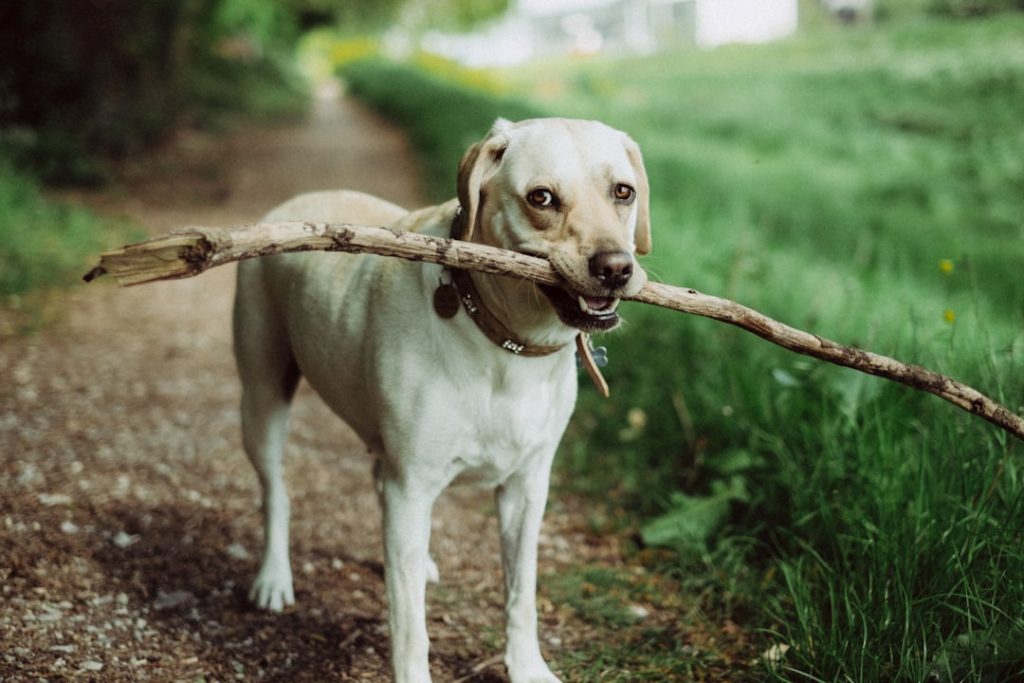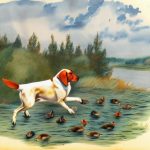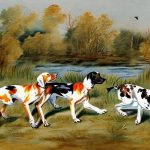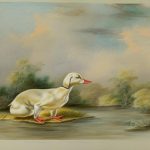When it comes to duck hunting, having the right breed of dog can make all the difference. There are several breeds that are particularly well-suited for this type of hunting, including the Labrador Retriever, the Chesapeake Bay Retriever, the Golden Retriever, and the Boykin Spaniel. These breeds are known for their strong swimming abilities, excellent retrieving skills, and high level of intelligence. Labrador Retrievers, in particular, are often considered the top choice for duck hunting due to their natural affinity for water and their strong work ethic. Chesapeake Bay Retrievers are also highly regarded for their ability to withstand cold water and harsh weather conditions, making them an excellent choice for duck hunting in challenging environments. Golden Retrievers are known for their gentle temperament and strong retrieving instincts, while Boykin Spaniels are prized for their compact size and versatility in both waterfowl and upland game hunting.
In addition to these breeds, other popular choices for duck hunting dogs include the German Shorthaired Pointer, the American Water Spaniel, and the Irish Water Spaniel. These breeds are known for their athleticism, endurance, and strong hunting instincts, making them well-suited for the rigors of duck hunting. Whether you prefer a breed with a long history of duck hunting prowess or a more versatile hunting dog, there are plenty of options to choose from when selecting a dog for your next duck hunting adventure.
Table of Contents
- 1 Choosing the right breed for your hunting needs
- 2 Training tips for duck hunting dogs
- 3 Understanding the unique skills and abilities of different breeds
- 4 The importance of a strong bond between hunter and dog
- 5 Health and safety considerations for duck hunting dogs
- 6 Other factors to consider when selecting a duck hunting dog
- 7 FAQs
Key Takeaways
- Labrador Retriever, Chesapeake Bay Retriever, and Golden Retriever are some of the best duck hunting breeds of dog
- Consider the hunting environment, weather conditions, and your own hunting style when choosing the right breed for your hunting needs
- Consistent and positive reinforcement training is essential for duck hunting dogs, focusing on obedience, retrieving, and water skills
- Different breeds have unique skills and abilities, such as the Labrador Retriever’s strong retrieving instinct and the Chesapeake Bay Retriever’s ability to withstand cold water
- A strong bond between hunter and dog is crucial for successful duck hunting, as it enhances communication and trust between the two
- Regular vet check-ups, proper nutrition, and safety gear like life jackets are important for the health and safety of duck hunting dogs
- Consider factors such as size, energy level, and compatibility with other pets when selecting a duck hunting dog
Choosing the right breed for your hunting needs
When it comes to choosing the right breed for your duck hunting needs, there are several factors to consider. First and foremost, you’ll want to think about the type of terrain and weather conditions you’ll be hunting in. If you’ll be facing cold water and harsh weather, a breed like the Chesapeake Bay Retriever or the Irish Water Spaniel may be a good choice due to their ability to withstand challenging conditions. On the other hand, if you’ll be hunting in more moderate climates, a breed like the Labrador Retriever or the Golden Retriever may be a better fit.
You’ll also want to consider the specific skills and abilities that are important for duck hunting. For example, if you’ll be hunting in areas with dense cover or thick brush, a breed with strong flushing abilities like the German Shorthaired Pointer may be a good choice. If you’ll be hunting in open water and need a dog with strong swimming abilities, a breed like the American Water Spaniel or the Boykin Spaniel may be more suitable. Additionally, consider the size and temperament of the breed, as well as any specific training or handling requirements that may be important for your hunting style. By taking these factors into account, you can ensure that you choose a breed that is well-suited for your specific duck hunting needs.
Training tips for duck hunting dogs
Training a duck hunting dog requires patience, consistency, and a deep understanding of the specific skills and behaviors needed for success in the field. Whether you’re working with a young puppy or an older dog, there are several key training tips to keep in mind. First and foremost, it’s important to start training early and to focus on building a strong foundation of obedience and basic commands. This includes teaching your dog to come when called, stay, sit, and heel, as well as introducing them to basic retrieving skills.
Once your dog has mastered these foundational skills, you can begin to introduce more advanced training techniques specific to duck hunting. This may include teaching your dog to retrieve from water, to remain steady in the blind or boat until given the command to retrieve, and to follow hand signals and whistle commands at a distance. It’s also important to expose your dog to a variety of hunting scenarios and environments, including different types of water and cover, as well as simulated hunting situations to build their confidence and experience.
Consistent training sessions, positive reinforcement, and plenty of practice in real hunting situations are key to developing a well-trained duck hunting dog. Additionally, working with a professional trainer or joining a training group can provide valuable guidance and support as you work to develop your dog’s skills for duck hunting.
Understanding the unique skills and abilities of different breeds
Each breed of dog brings its own unique set of skills and abilities to the table when it comes to duck hunting. Understanding these differences can help you choose the right breed for your specific hunting needs and can also inform your training approach as you work to develop your dog’s skills in the field.
For example, Labrador Retrievers are known for their strong swimming abilities, excellent retrieving skills, and high level of intelligence. They are also highly adaptable and versatile in a variety of hunting scenarios, making them a popular choice for duck hunting. Chesapeake Bay Retrievers, on the other hand, are prized for their ability to withstand cold water and harsh weather conditions, as well as their strong work ethic and determination in the field. Golden Retrievers are known for their gentle temperament and strong retrieving instincts, making them well-suited for both waterfowl and upland game hunting.
Other breeds like the German Shorthaired Pointer are known for their athleticism, endurance, and strong flushing abilities in dense cover or thick brush. American Water Spaniels are prized for their versatility in both waterfowl and upland game hunting, as well as their strong swimming abilities and compact size. Boykin Spaniels are known for their agility and versatility in various hunting scenarios, as well as their compact size and friendly disposition.
By understanding the unique skills and abilities of different breeds, you can make an informed decision when choosing a duck hunting dog and can tailor your training approach to best develop their natural talents in the field.
The importance of a strong bond between hunter and dog
Building a strong bond between hunter and dog is essential for success in duck hunting. A deep connection based on trust, communication, and mutual respect can enhance your dog’s performance in the field and create a more rewarding experience for both of you. Developing this bond requires time, patience, and consistent effort on the part of the hunter.
One way to strengthen the bond with your duck hunting dog is through regular training sessions that focus on building trust and reinforcing positive behaviors. By working together on obedience commands, retrieving skills, and simulated hunting scenarios, you can establish clear communication and develop a sense of teamwork with your dog. Additionally, spending quality time together outside of training sessions can help strengthen your bond, whether it’s through regular exercise, playtime, or simply enjoying each other’s company.
Another important aspect of building a strong bond with your duck hunting dog is understanding their individual needs and preferences. This includes providing proper care, nutrition, exercise, and attention to ensure that your dog feels valued and supported. By meeting their physical and emotional needs, you can create a strong foundation for a trusting relationship built on mutual understanding and respect.
Ultimately, a strong bond between hunter and dog can enhance your teamwork in the field, improve your dog’s performance as a hunting companion, and create a deeper sense of companionship and loyalty that enriches both of your lives.
Health and safety considerations for duck hunting dogs
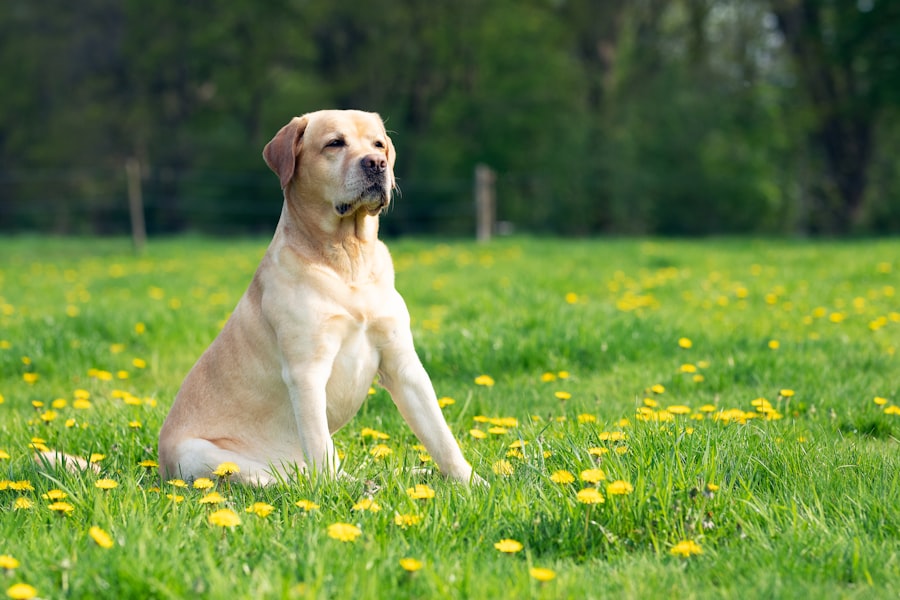
When it comes to duck hunting dogs, health and safety considerations are paramount to ensure that your canine companion remains happy, healthy, and safe in the field. This includes proper care before, during, and after hunting trips to minimize the risk of injury or illness.
Before heading out on a hunt, it’s important to ensure that your dog is in good physical condition and up-to-date on all necessary vaccinations and preventative medications. This includes regular veterinary check-ups to monitor their overall health and address any potential issues that may impact their ability to hunt safely.
During hunting trips, it’s essential to provide proper protection from environmental hazards such as cold water exposure or extreme weather conditions. This may include using protective gear like neoprene vests or jackets to keep your dog warm and buoyant in cold water, as well as providing shelter from harsh weather when necessary.
After returning from a hunt, it’s important to thoroughly check your dog for any signs of injury or illness and provide proper care as needed. This may include cleaning wounds or removing debris from their coat or paws, as well as monitoring them for any signs of fatigue or discomfort that may require rest or medical attention.
By prioritizing the health and safety of your duck hunting dog throughout every stage of the hunting process, you can ensure that they remain happy, healthy, and able to perform at their best in the field.
Other factors to consider when selecting a duck hunting dog
In addition to breed-specific skills and training considerations, there are several other factors to consider when selecting a duck hunting dog. This includes evaluating the individual temperament and personality traits of each dog to ensure that they are well-suited for the demands of duck hunting.
For example, some dogs may have a more independent nature while others may thrive on close collaboration with their handler. Understanding these differences can help you choose a dog whose personality aligns with your own preferences and hunting style.
It’s also important to consider the specific demands of duck hunting in terms of physical endurance, adaptability to different environments, and resilience in challenging conditions. Some breeds may excel in cold water retrieval while others may be better suited for upland game hunting or tracking in dense cover.
Additionally, consider any specific lifestyle factors that may impact your ability to care for and train a duck hunting dog effectively. This includes evaluating your available time for training and exercise, as well as any potential limitations related to housing or living arrangements that may impact your ability to provide proper care for a hunting dog.
By taking these factors into account when selecting a duck hunting dog, you can make an informed decision that aligns with your specific needs and preferences while ensuring that your canine companion is well-equipped for success in the field.
If you’re a duck hunter looking for the perfect hunting companion, choosing the right breed of dog is crucial. In a recent article on PoultryWizard, “The Best Duck Hunting Breeds of Dog,” you can learn about the top breeds that are well-suited for duck hunting. Whether you’re considering a Labrador Retriever, Chesapeake Bay Retriever, or another breed, this article provides valuable insights to help you make an informed decision. Check it out here!
FAQs
What are some popular duck hunting breeds of dog?
Some popular duck hunting breeds of dog include Labrador Retrievers, Golden Retrievers, Chesapeake Bay Retrievers, and German Shorthaired Pointers.
What qualities make a good duck hunting dog?
Good duck hunting dogs should have a strong retrieving instinct, be able to work in water, have a good nose for tracking, and be obedient and trainable.
What are some training tips for duck hunting dogs?
Training tips for duck hunting dogs include starting with basic obedience training, introducing them to water and retrieving at a young age, and gradually exposing them to the sights and sounds of hunting.
How can I choose the right duck hunting breed of dog for me?
When choosing a duck hunting breed of dog, consider factors such as your hunting environment, the dog’s energy level and temperament, and your experience level with training and handling dogs.
What are some health considerations for duck hunting dogs?
Health considerations for duck hunting dogs include ensuring they are up to date on vaccinations, protecting them from waterborne illnesses, and monitoring them for injuries or strains from hunting activities.
Meet Walter, the feathered-friend fanatic of Florida! Nestled in the sunshine state, Walter struts through life with his feathered companions, clucking his way to happiness. With a coop that’s fancier than a five-star hotel, he’s the Don Juan of the chicken world. When he’s not teaching his hens to do the cha-cha, you’ll find him in a heated debate with his prized rooster, Sir Clucks-a-Lot. Walter’s poultry passion is no yolk; he’s the sunny-side-up guy you never knew you needed in your flock of friends!

